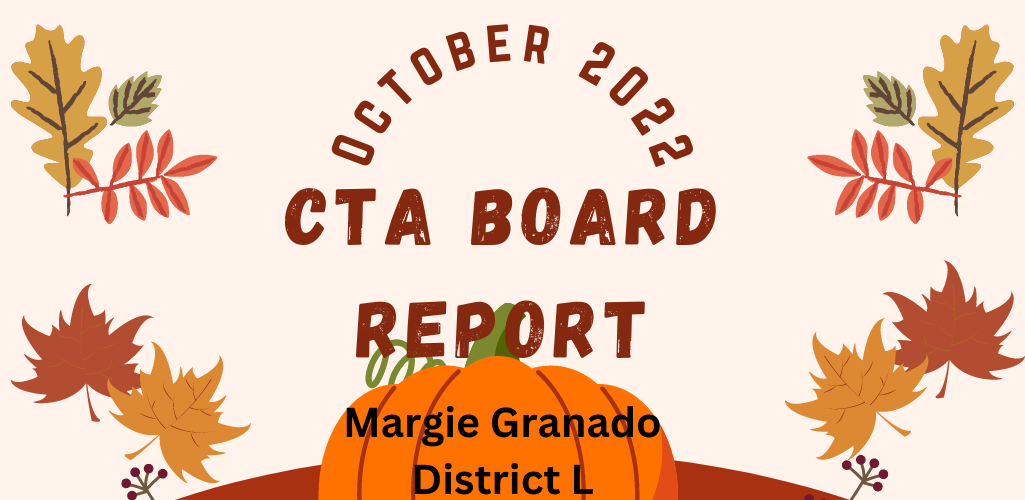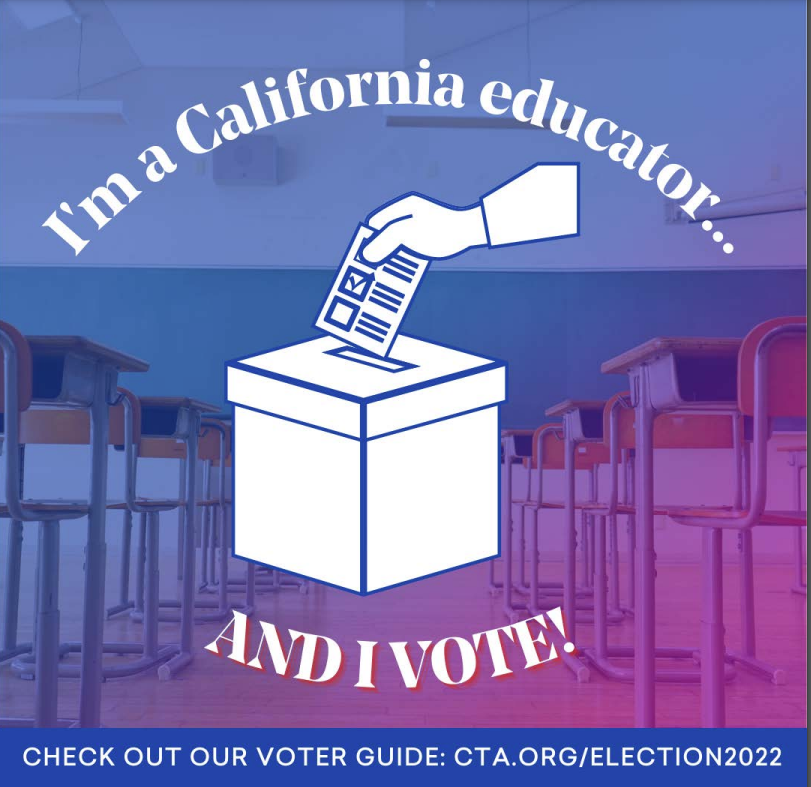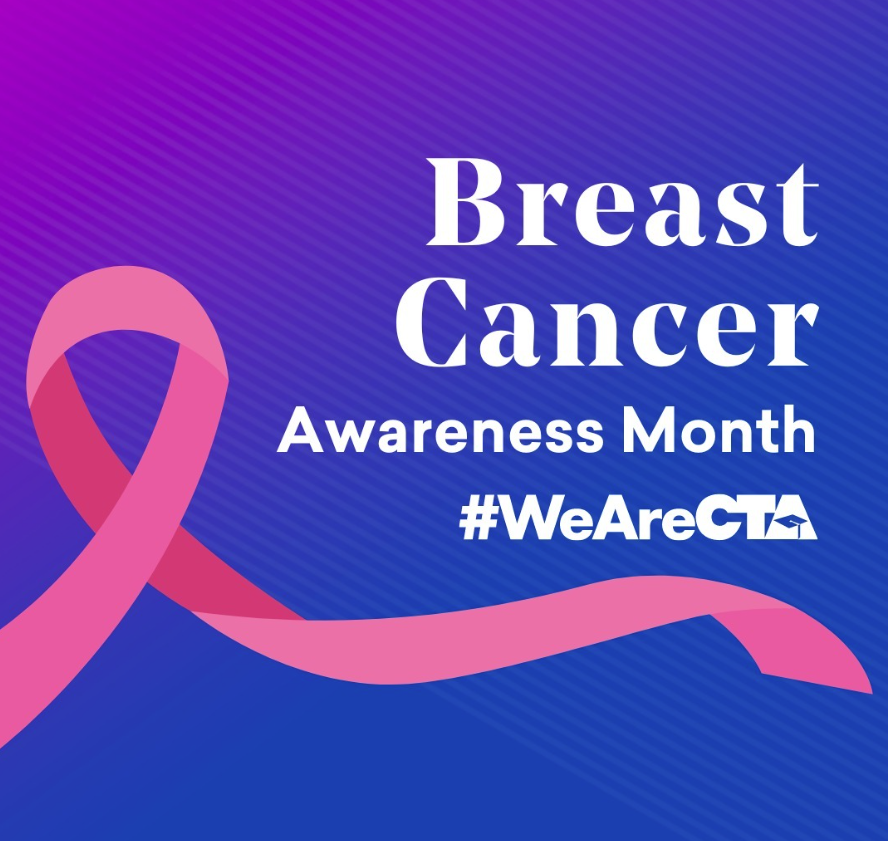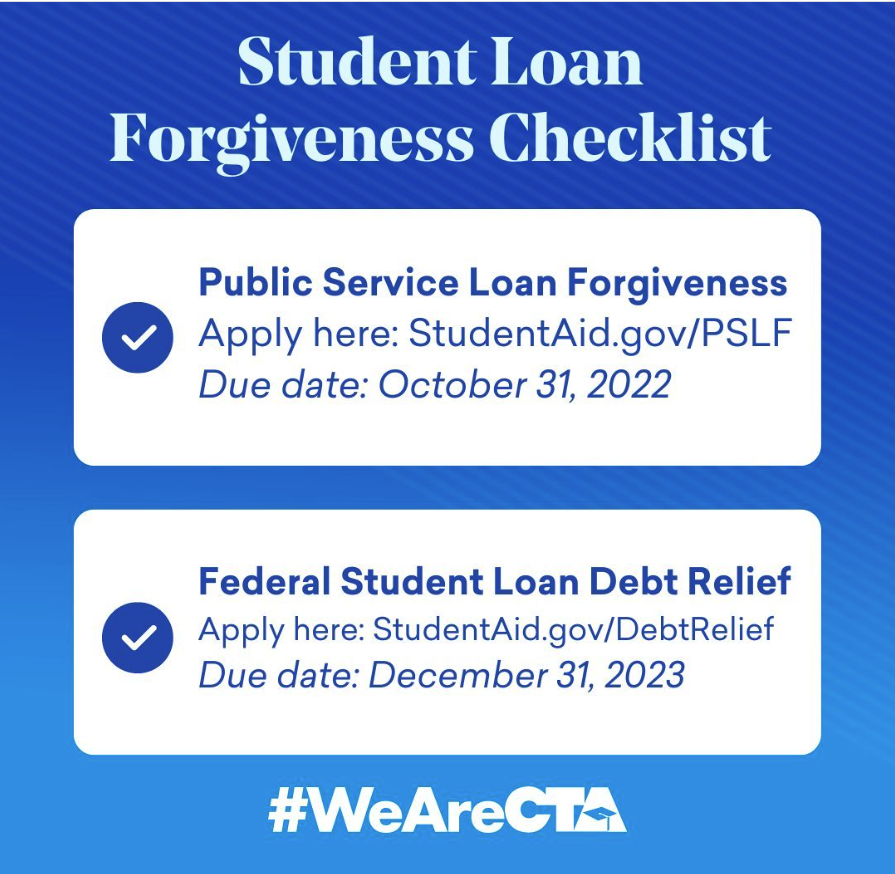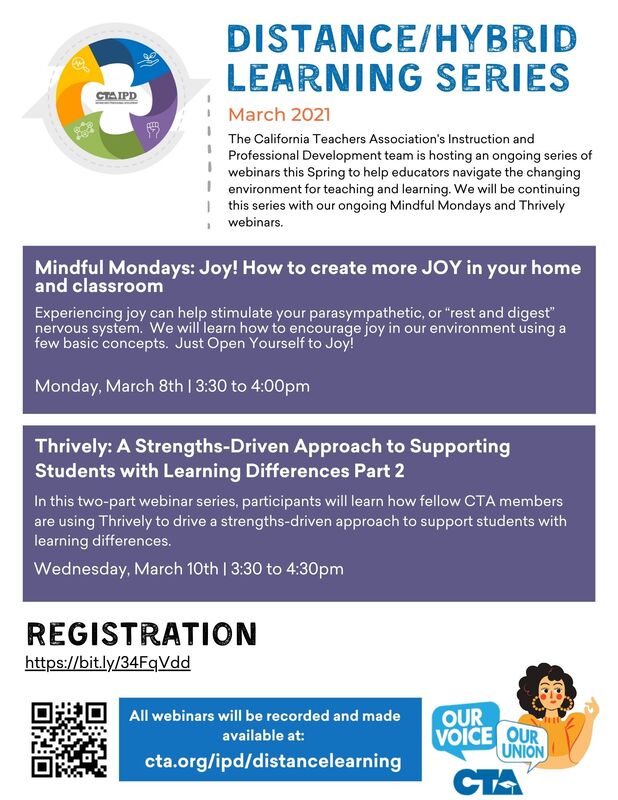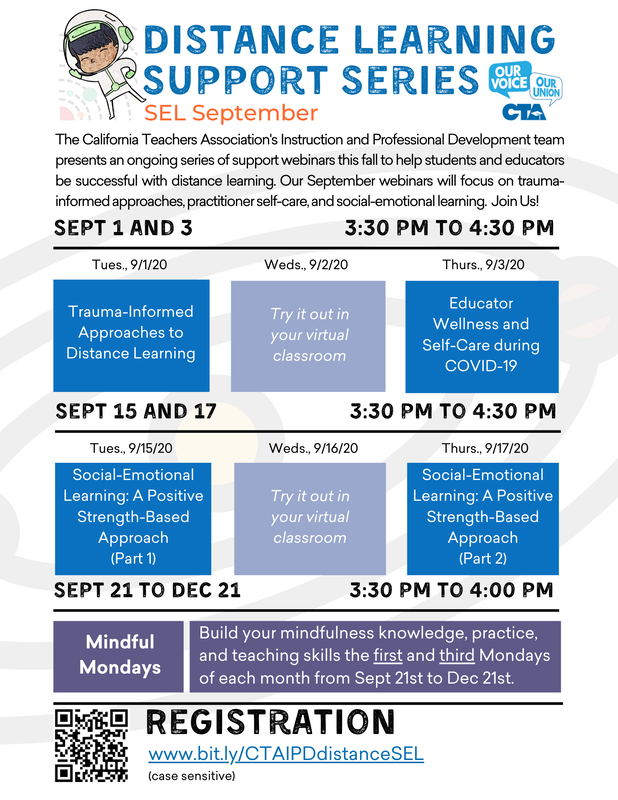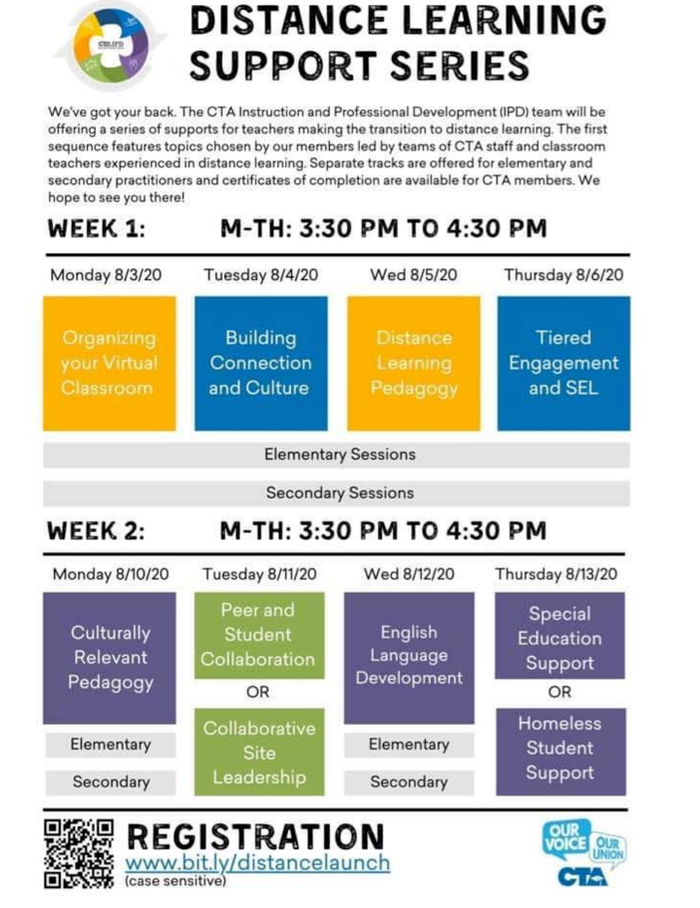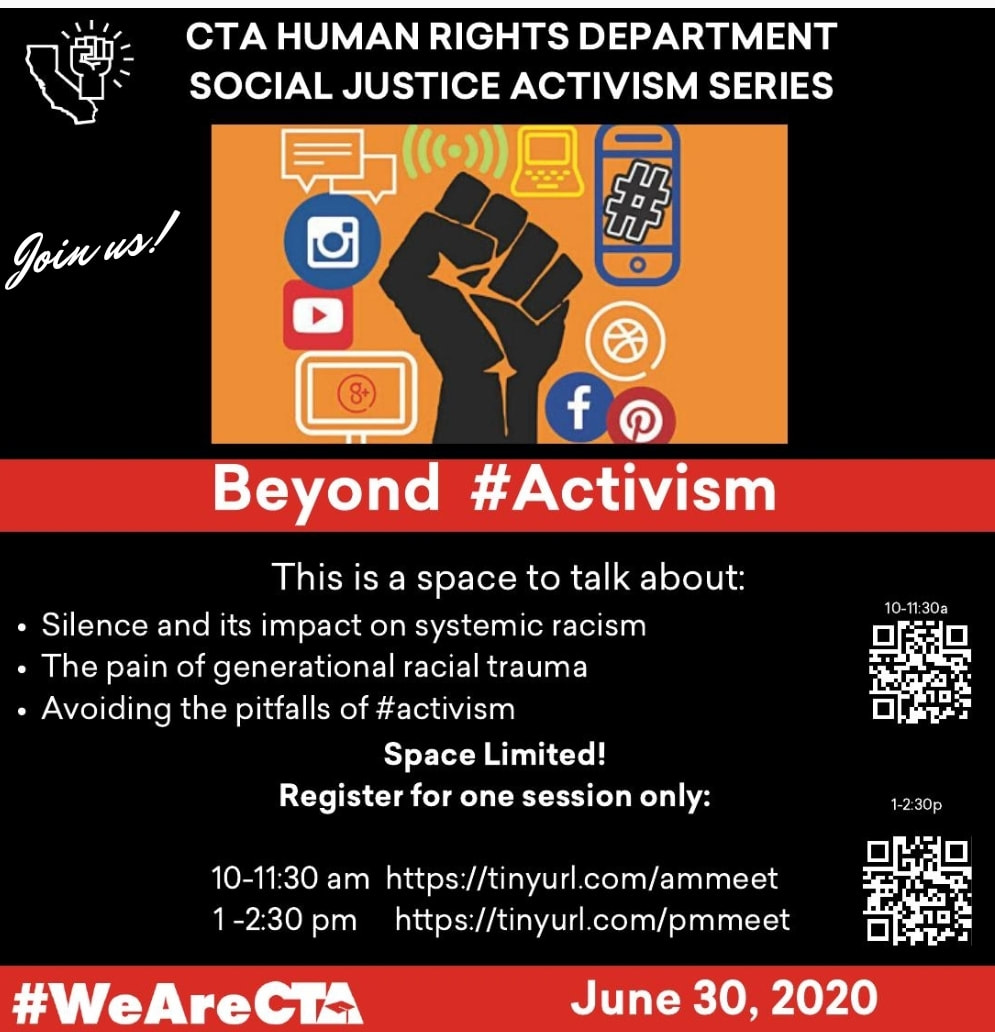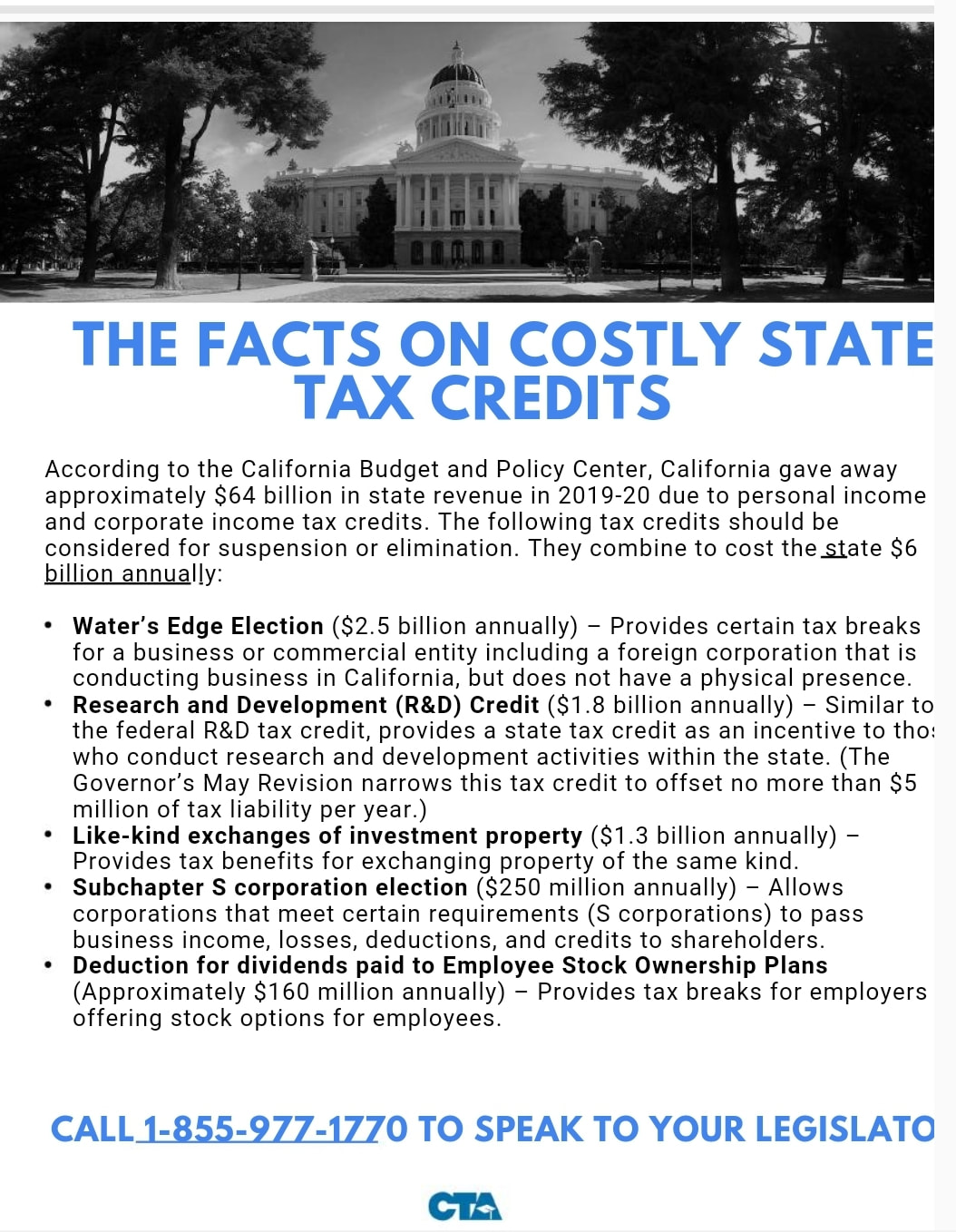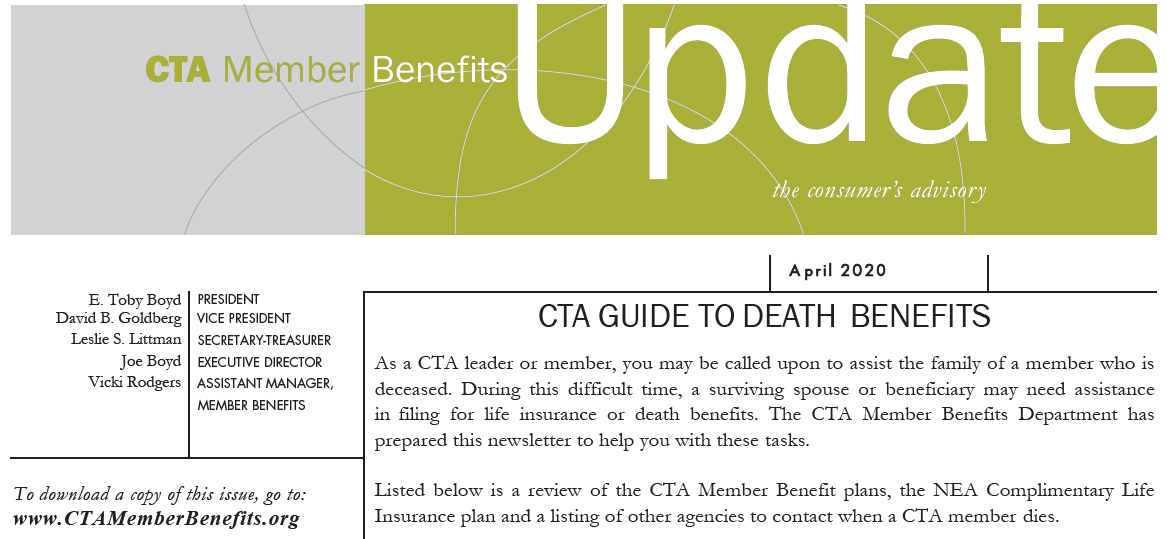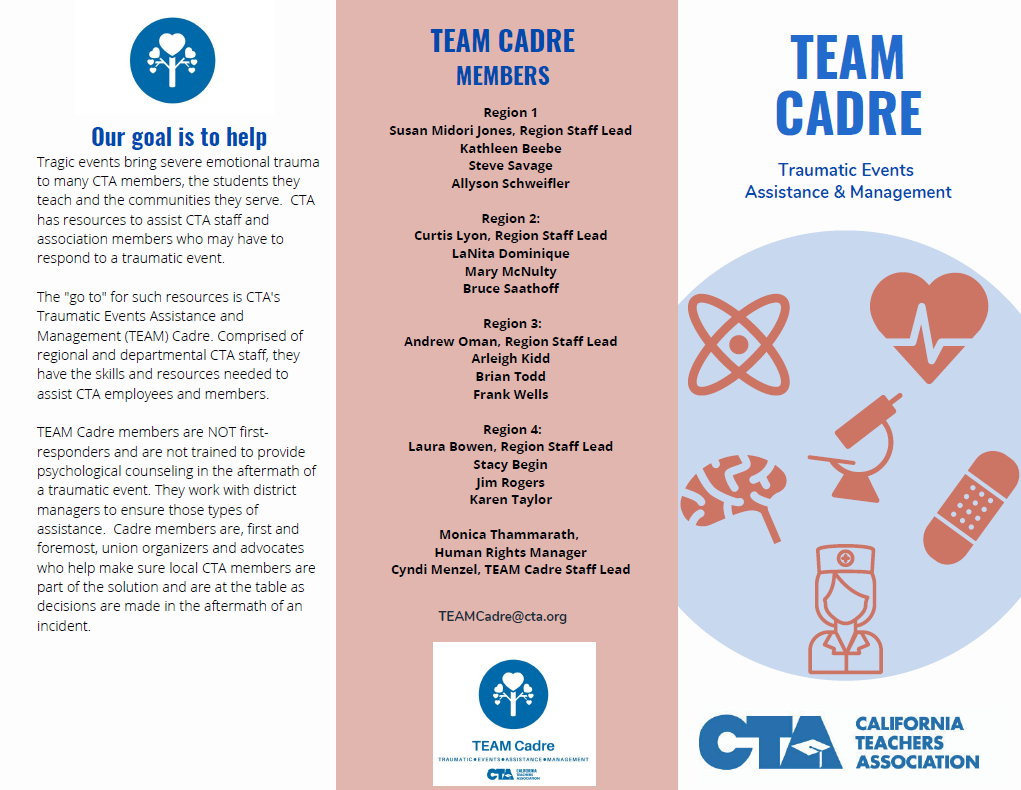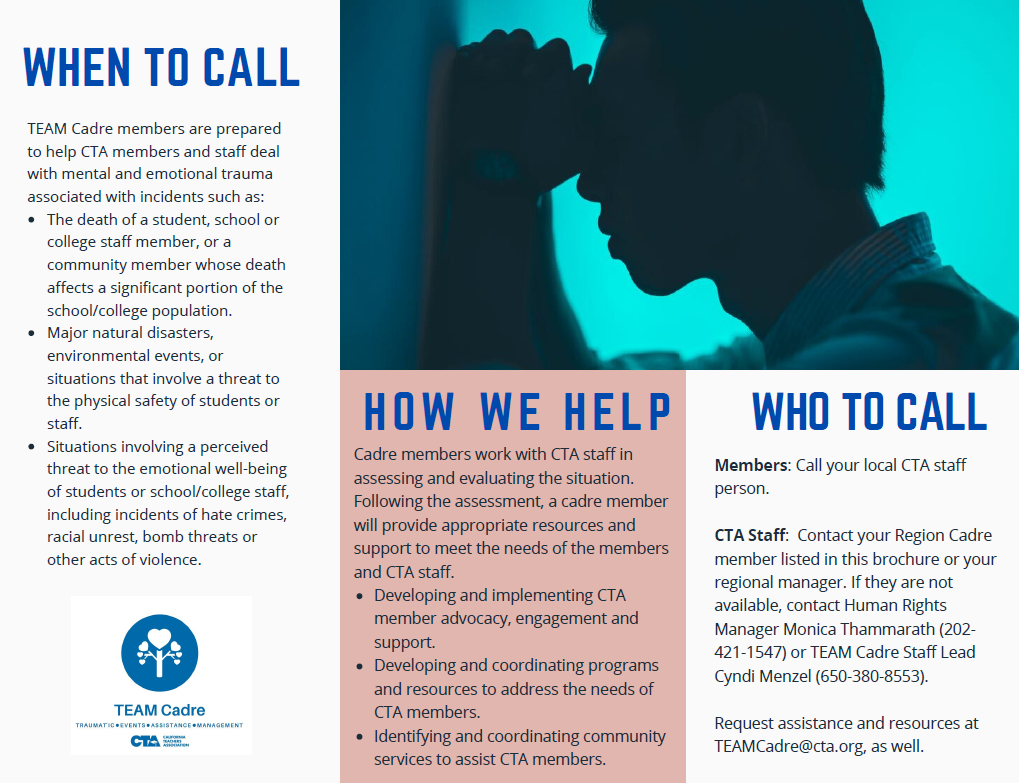CTA News
The CTA Board of Directors held it's regularly scheduled October Board meeting on Oct.11-12 at CTA Headquarters in Burlingame.November 8th is almost here!As if the regular day to day work isn't a lot, we have many school board elections taking place that may have a huge impact on the working conditions of our members and the learning conditions of our students.
Below are many reports and information that you are free to share with your members. There is a button dedicated to all of the reports ad supporting documents.
I have included a button that takes you to the Federal Student Loan Forgiveness program, deadline is fast approaching, so share the link and tell your people not to wait!
Margie Granado
Below are many reports and information that you are free to share with your members. There is a button dedicated to all of the reports ad supporting documents.
I have included a button that takes you to the Federal Student Loan Forgiveness program, deadline is fast approaching, so share the link and tell your people not to wait!
Margie Granado
Grassroots Lobbying Report
Support staff have begun reaching out to legislative offices across the state to schedule meetings that will occur during October. During these meetings, we will debrief the 2021-22 legislative session, discuss legislative goals for the upcoming session, and ways we can partner with legislators to accomplish these goals.
Treasurer’s Report
The financial reports for the period ending August 31, 2022 are attached. The reports are unaudited but represent all transactions processed through August 31. Comments regarding the specific reports follow.
Active Membership and FDE – FDE (full dues equivalents) are 267,661 as of August 31, 2022. The Active Members & FDE graphs on page 2 display a downward trend post-Janus and during the pandemic. We continue to cautiously monitor our FDE and dues funding. Note: The increase/decrease in members in any month may not correlate (one-to-one) with the FDE increase/decrease due to the impact of fulltime and various part-time categories in calculating FDE.
Statement of Financial Position – CTA’s financial condition remains strong. Continued monitoring of our financial condition allows us to manage the Association amidst the various challenges facing our students, our members, and public education.
Summary of Income/Expense – With the exception of dues revenue and unrealized loss on investments, CTA operated within budgeted guidelines for the year ended August 31, 2022.
Informational Financial Topic – Fiscal YearEnd Audit Process CTA launched the start of the new fiscal year 2022-2023 in September and is simultaneously working to close out the prior fiscal year 2021- 2022 in preparation of the annual audit.
For the annual audit, CTA reconciles accounts and generates work papers to assist the auditors in their testing of our financial statements. The independent audit firm Deloitte & Touche LLP will be conducting the CTA annual financial audit over several weeks. Testing is conducted so the auditors can issue an opinion on the fairness of the Association’s financial statements. The independent auditor report is presented in conjunction with CTA’s financial statements. CTA’s financial statements include:
• A statement of financial condition – summary of what is owned and owed, commonly referred to as a balance sheet
• A statement of activities and changes in net assets – summary of revenue and expenses and the impact on net worth
• A statement of cash flows – summary of cash inflows and outflows
• Footnotes – disclosure information to supplement the financial statements
The auditors conduct interim and year-end fieldwork. Interim fieldwork occurs in the summer and consists of audit planning, documenting the flow of transactions, assessing, and testing internal controls, evaluating computer systems and related controls, and testing of CTA transactions.
Year-end fieldwork includes examining, on a test basis, amounts and disclosures in CTA’s financial statements, assessing accounting principles used and making inquiries of management. Once year end fieldwork has been completed, the audited financial statements are issued with the independent audit report. This report is also referred to as the auditor’s opinion.
The CTA audit for the 2021-2022 year is scheduled to be presented to the Board of Directors at the January 2023 Board meeting. State Council will receive the audit as part of the annual report at the January 2023 State Council meeting.
Support staff have begun reaching out to legislative offices across the state to schedule meetings that will occur during October. During these meetings, we will debrief the 2021-22 legislative session, discuss legislative goals for the upcoming session, and ways we can partner with legislators to accomplish these goals.
Treasurer’s Report
The financial reports for the period ending August 31, 2022 are attached. The reports are unaudited but represent all transactions processed through August 31. Comments regarding the specific reports follow.
Active Membership and FDE – FDE (full dues equivalents) are 267,661 as of August 31, 2022. The Active Members & FDE graphs on page 2 display a downward trend post-Janus and during the pandemic. We continue to cautiously monitor our FDE and dues funding. Note: The increase/decrease in members in any month may not correlate (one-to-one) with the FDE increase/decrease due to the impact of fulltime and various part-time categories in calculating FDE.
Statement of Financial Position – CTA’s financial condition remains strong. Continued monitoring of our financial condition allows us to manage the Association amidst the various challenges facing our students, our members, and public education.
Summary of Income/Expense – With the exception of dues revenue and unrealized loss on investments, CTA operated within budgeted guidelines for the year ended August 31, 2022.
Informational Financial Topic – Fiscal YearEnd Audit Process CTA launched the start of the new fiscal year 2022-2023 in September and is simultaneously working to close out the prior fiscal year 2021- 2022 in preparation of the annual audit.
For the annual audit, CTA reconciles accounts and generates work papers to assist the auditors in their testing of our financial statements. The independent audit firm Deloitte & Touche LLP will be conducting the CTA annual financial audit over several weeks. Testing is conducted so the auditors can issue an opinion on the fairness of the Association’s financial statements. The independent auditor report is presented in conjunction with CTA’s financial statements. CTA’s financial statements include:
• A statement of financial condition – summary of what is owned and owed, commonly referred to as a balance sheet
• A statement of activities and changes in net assets – summary of revenue and expenses and the impact on net worth
• A statement of cash flows – summary of cash inflows and outflows
• Footnotes – disclosure information to supplement the financial statements
The auditors conduct interim and year-end fieldwork. Interim fieldwork occurs in the summer and consists of audit planning, documenting the flow of transactions, assessing, and testing internal controls, evaluating computer systems and related controls, and testing of CTA transactions.
Year-end fieldwork includes examining, on a test basis, amounts and disclosures in CTA’s financial statements, assessing accounting principles used and making inquiries of management. Once year end fieldwork has been completed, the audited financial statements are issued with the independent audit report. This report is also referred to as the auditor’s opinion.
The CTA audit for the 2021-2022 year is scheduled to be presented to the Board of Directors at the January 2023 Board meeting. State Council will receive the audit as part of the annual report at the January 2023 State Council meeting.
Grassroots Lobbying Report
Support staff have begun reaching out to legislative offices across the state to schedule meetings that will occur during October. During these meetings, we will debrief the 2021-22 legislative session, discuss legislative goals for the upcoming session, and ways we can partner with legislators to accomplish these goals.
Treasurer’s Report
The financial reports for the period ending August 31, 2022 are attached. The reports are unaudited but represent all transactions processed through August 31. Comments regarding the specific reports follow.
Active Membership and FDE – FDE (full dues equivalents) are 267,661 as of August 31, 2022. The Active Members & FDE graphs on page 2 display a downward trend post-Janus and during the pandemic. We continue to cautiously monitor our FDE and dues funding. Note: The increase/decrease in members in any month may not correlate (one-to-one) with the FDE increase/decrease due to the impact of fulltime and various part-time categories in calculating FDE.
Statement of Financial Position – CTA’s financial condition remains strong. Continued monitoring of our financial condition allows us to manage the Association amidst the various challenges facing our students, our members, and public education.
Summary of Income/Expense – With the exception of dues revenue and unrealized loss on investments, CTA operated within budgeted guidelines for the year ended August 31, 2022.
Informational Financial Topic – Fiscal YearEnd Audit Process CTA launched the start of the new fiscal year 2022-2023 in September and is simultaneously working to close out the prior fiscal year 2021- 2022 in preparation of the annual audit.
For the annual audit, CTA reconciles accounts and generates work papers to assist the auditors in their testing of our financial statements. The independent audit firm Deloitte & Touche LLP will be conducting the CTA annual financial audit over several weeks. Testing is conducted so the auditors can issue an opinion on the fairness of the Association’s financial statements. The independent auditor report is presented in conjunction with CTA’s financial statements. CTA’s financial statements include:
• A statement of financial condition – summary of what is owned and owed, commonly referred to as a balance sheet
• A statement of activities and changes in net assets – summary of revenue and expenses and the impact on net worth
• A statement of cash flows – summary of cash inflows and outflows
• Footnotes – disclosure information to supplement the financial statements
The auditors conduct interim and year-end fieldwork. Interim fieldwork occurs in the summer and consists of audit planning, documenting the flow of transactions, assessing, and testing internal controls, evaluating computer systems and related controls, and testing of CTA transactions.
Year-end fieldwork includes examining, on a test basis, amounts and disclosures in CTA’s financial statements, assessing accounting principles used and making inquiries of management. Once year end fieldwork has been completed, the audited financial statements are issued with the independent audit report. This report is also referred to as the auditor’s opinion.
The CTA audit for the 2021-2022 year is scheduled to be presented to the Board of Directors at the January 2023 Board meeting. State Council will receive the audit as part of the annual report at the January 2023 State Council meeting.
Support staff have begun reaching out to legislative offices across the state to schedule meetings that will occur during October. During these meetings, we will debrief the 2021-22 legislative session, discuss legislative goals for the upcoming session, and ways we can partner with legislators to accomplish these goals.
Treasurer’s Report
The financial reports for the period ending August 31, 2022 are attached. The reports are unaudited but represent all transactions processed through August 31. Comments regarding the specific reports follow.
Active Membership and FDE – FDE (full dues equivalents) are 267,661 as of August 31, 2022. The Active Members & FDE graphs on page 2 display a downward trend post-Janus and during the pandemic. We continue to cautiously monitor our FDE and dues funding. Note: The increase/decrease in members in any month may not correlate (one-to-one) with the FDE increase/decrease due to the impact of fulltime and various part-time categories in calculating FDE.
Statement of Financial Position – CTA’s financial condition remains strong. Continued monitoring of our financial condition allows us to manage the Association amidst the various challenges facing our students, our members, and public education.
Summary of Income/Expense – With the exception of dues revenue and unrealized loss on investments, CTA operated within budgeted guidelines for the year ended August 31, 2022.
Informational Financial Topic – Fiscal YearEnd Audit Process CTA launched the start of the new fiscal year 2022-2023 in September and is simultaneously working to close out the prior fiscal year 2021- 2022 in preparation of the annual audit.
For the annual audit, CTA reconciles accounts and generates work papers to assist the auditors in their testing of our financial statements. The independent audit firm Deloitte & Touche LLP will be conducting the CTA annual financial audit over several weeks. Testing is conducted so the auditors can issue an opinion on the fairness of the Association’s financial statements. The independent auditor report is presented in conjunction with CTA’s financial statements. CTA’s financial statements include:
• A statement of financial condition – summary of what is owned and owed, commonly referred to as a balance sheet
• A statement of activities and changes in net assets – summary of revenue and expenses and the impact on net worth
• A statement of cash flows – summary of cash inflows and outflows
• Footnotes – disclosure information to supplement the financial statements
The auditors conduct interim and year-end fieldwork. Interim fieldwork occurs in the summer and consists of audit planning, documenting the flow of transactions, assessing, and testing internal controls, evaluating computer systems and related controls, and testing of CTA transactions.
Year-end fieldwork includes examining, on a test basis, amounts and disclosures in CTA’s financial statements, assessing accounting principles used and making inquiries of management. Once year end fieldwork has been completed, the audited financial statements are issued with the independent audit report. This report is also referred to as the auditor’s opinion.
The CTA audit for the 2021-2022 year is scheduled to be presented to the Board of Directors at the January 2023 Board meeting. State Council will receive the audit as part of the annual report at the January 2023 State Council meeting.
Transforming the Profession
CTA Special Education Conference
Over 600 educators gathered for the first in-person CTA Special Education Conference in Burlingame the weekend of September 30-October 2. Highlights from the conference included keynote speakers Carrie Flint, a special education educator who spoke about her own experiences as a parent of a child with a hidden disability, and Kathy Buckley, a well-known celebrity comedian who self-identifies as “America’s Favorite Hearing-Impaired Comedienne”.
The New Educator Pipeline and Support Workgroup
Following the release of the educator survey, CTA’s Educator Pipeline and Support Workgroup met at the Burlingame Office on Thursday, September 29 for the first of three meetings to explore options and solutions to the educator shortage. The workgroup is composed of members from various CTA State Council committees and other educators working in programs designed to support new teachers. The workgroup is chaired by CTA Secretary-Treasurer Leslie Littman and supported by CTA Board Liaison Chris Bushée and staff from the Instruction and Professional Development and Government Relations departments.
During the initial meeting, workgroup participants had the opportunity to review the findings of the recent CTA/UCLA study, “Voices from the Classroom: Developing a Strategy for Teacher Retention and Recruitment,” and ask questions directly from the researchers. After lunch, workgroup members selected to participate in one for three focus areas: 1) teacher pipeline programs, 2) teacher preparation, and 3) teacher recruitment and retention. Diversity, equity, and inclusion is a cross-cutting consideration for all focus areas.
Within the smaller groups, participants analyzed data/text sets specific to their focus areas, to surface observations, questions, and plans for identifying effective strategies for addressing challenges contributing to the ongoing teacher shortage and teacher retention. The small groups will continue to work—and share with one another—ahead of the next virtual meeting in February, which will center on surfacing possible strategies for:
CTA Special Education Conference
Over 600 educators gathered for the first in-person CTA Special Education Conference in Burlingame the weekend of September 30-October 2. Highlights from the conference included keynote speakers Carrie Flint, a special education educator who spoke about her own experiences as a parent of a child with a hidden disability, and Kathy Buckley, a well-known celebrity comedian who self-identifies as “America’s Favorite Hearing-Impaired Comedienne”.
The New Educator Pipeline and Support Workgroup
Following the release of the educator survey, CTA’s Educator Pipeline and Support Workgroup met at the Burlingame Office on Thursday, September 29 for the first of three meetings to explore options and solutions to the educator shortage. The workgroup is composed of members from various CTA State Council committees and other educators working in programs designed to support new teachers. The workgroup is chaired by CTA Secretary-Treasurer Leslie Littman and supported by CTA Board Liaison Chris Bushée and staff from the Instruction and Professional Development and Government Relations departments.
During the initial meeting, workgroup participants had the opportunity to review the findings of the recent CTA/UCLA study, “Voices from the Classroom: Developing a Strategy for Teacher Retention and Recruitment,” and ask questions directly from the researchers. After lunch, workgroup members selected to participate in one for three focus areas: 1) teacher pipeline programs, 2) teacher preparation, and 3) teacher recruitment and retention. Diversity, equity, and inclusion is a cross-cutting consideration for all focus areas.
Within the smaller groups, participants analyzed data/text sets specific to their focus areas, to surface observations, questions, and plans for identifying effective strategies for addressing challenges contributing to the ongoing teacher shortage and teacher retention. The small groups will continue to work—and share with one another—ahead of the next virtual meeting in February, which will center on surfacing possible strategies for:
- September 2022 - Explore the problem
- February 2023 - Discuss approaches to address the problem
- April/May 2023 - Finalize recommendations to the CTA Board.
Organizing for Racial and Social Justice
Local Chapters
Chapters throughout the state are taking the lead to ensure students continue to thrive and unit members continue to have the best resources to support those students.
Highlights of the great work being done throughout the state to support our colleagues, our students and our communities include:
Institute for Teaching Report
IFT grants provide educators with an opportunity to transform their classroom and school site with innovative ideas and student-centered learning practices. To promote the IFT grant program, we provide training/presentations and staff a vendor table full of IFT resources at CTA conferences. Our goal is to increase the number of grants awarded each year to a larger selection of Locals.
Upcoming Trainings/Presentations
Virtual Grant Writing Workshops
Issues Conference
Good Teaching Conference (North and South)
Support for Members and Current Grant Recipients
The goal of IFT is to support members who are interested in applying for an IFT grant and also assisting grant recipients with the successful implementation of their current grant project. Members can reach us by email, phone, or video conference. Also, we offer group check-ins, one-on-one sessions, and office hours on Tuesdays through our Booking Site.
The next open grant application submission period will be from December 1, 2022 – March 31, 2023.
Find more information at Institute for Teaching (IFT) - California Teachers Association (cta.org)
- CTA’s Racial and Social Justice Advisory Committee, as well as the Racial Equity Steering Committee has recently partnered with Re-Center.org to help advance our work and commitment to fostering and promoting racial equity and social justice in our association.
- Promote ethnic minority representation in all areas of CTA leadership
- Monitor ethnic minority representation within the Association as set forth in governing documents
- Provide ethnic minority input on CTA member programs and policies
- Work with the Racial Equity Steering Committee to make specific recommendations to the Board for continuing ethnic minority input
- Work toward an inclusive association that involves and empowers its equity minded members
- Advise the Board in addressing the needs of California’s ethnically diverse student population
- Two new BIPOC National Board Cohorts have launched in the 2022-2023 school year, bringing the total number of participants to 40. A record number of applications were submitted to participate in the CTA/Stanford Cohort. BIPOC Cohort members will receive a full scholarship for the support program costs, along with group and individualized support from the BIPOC National Board Certified Teachers. Cohort members will also receive help in assessing the California National Board Incentive program, which covers the full cost of National Board Certification and pays those who successfully certify and commit to working in a high-needs school $5k for five years.
- The Human Rights Cadre Training Program supports CTA members who are passionate about developing racial and social justice perspectives of other CTA members. Cadre Trainers offer training sessions in the following content areas: Transformative Social Emotional Learning, Racial Justice Advocacy, LGBTQ+ Leadership Advocacy, Women's Leadership Advocacy, and BIPOC Leadership Advocacy. These sessions are available at many of the CTA statewide conferences. Locals can also work with their CTA Primary Contact Staff to learn how to bring cadre training to your local.
Local Chapters
Chapters throughout the state are taking the lead to ensure students continue to thrive and unit members continue to have the best resources to support those students.
Highlights of the great work being done throughout the state to support our colleagues, our students and our communities include:
- Working collaboratively with the district leadership to develop a comprehensive ethnic studies curriculum
- Working to develop a counter program to support teachers and locals to combat the attack on educators freedom
- Bringing into locals the resources available including Unconscious Bias
- Putting a strong focus on building capacity within locals
- Strengthening the participation and work of chapter equity teams
- Development of a guide for members focusing on racial and social justice
- Chapters across multiple counties working in collaboration with staff have created an education coalition whose goal is to coordinate bargaining efforts
Institute for Teaching Report
IFT grants provide educators with an opportunity to transform their classroom and school site with innovative ideas and student-centered learning practices. To promote the IFT grant program, we provide training/presentations and staff a vendor table full of IFT resources at CTA conferences. Our goal is to increase the number of grants awarded each year to a larger selection of Locals.
Upcoming Trainings/Presentations
Virtual Grant Writing Workshops
Issues Conference
Good Teaching Conference (North and South)
Support for Members and Current Grant Recipients
The goal of IFT is to support members who are interested in applying for an IFT grant and also assisting grant recipients with the successful implementation of their current grant project. Members can reach us by email, phone, or video conference. Also, we offer group check-ins, one-on-one sessions, and office hours on Tuesdays through our Booking Site.
The next open grant application submission period will be from December 1, 2022 – March 31, 2023.
Find more information at Institute for Teaching (IFT) - California Teachers Association (cta.org)
Board Actions
At the October CTA Board Meeting, the Board of Directors received reports from IFT, Higher Ed, CTA/NEA Coordinating Director, CTA Officers and Executive Director, and various CTA Departments.
The CTA Board received the EMEID Final Assessment Report and heard detailed presentations on the upcoming 2022 General Election. The Board also received the annual report from the CTA Investment Committee, as well as the 2021-22 Cadre Training Program Final Report.
Lastly the Board took action on several employee hires, final votes and ratifications of Chapter ABC funding requests, had initial conversations pertaining to CAS/CSO negotiations, and received a detailed report on pending litigation important to Public Education and Unions.
At-Large Director Board Report
Welcome to October
At the October CTA Board Meeting, the Board of Directors received reports from IFT, Higher Ed, CTA/NEA Coordinating Director, CTA Officers and Executive Director, and various CTA Departments.
The CTA Board received the EMEID Final Assessment Report and heard detailed presentations on the upcoming 2022 General Election. The Board also received the annual report from the CTA Investment Committee, as well as the 2021-22 Cadre Training Program Final Report.
Lastly the Board took action on several employee hires, final votes and ratifications of Chapter ABC funding requests, had initial conversations pertaining to CAS/CSO negotiations, and received a detailed report on pending litigation important to Public Education and Unions.
At-Large Director Board Report
Welcome to October
Breast Cancer Awareness Month is an annual international health campaign to increase awareness of the disease and to raise funds for research.
https://www.cta.org/awareness-events/breast-cancer-awareness-month
https://www.cta.org/educator/posts/know-your-lemons
https://www.cta.org/awareness-events/breast-cancer-awareness-month
https://www.cta.org/educator/posts/know-your-lemons
LGBT History Month is an annual month-long observance of lesbian, gay, bisexual and transgender history, and the history of the gay rights and related civil rights movements. It was founded in 1994 by Missouri high-school history teacher Rodney Wilson. https://lgbthistorymonth.com/
CTA Human Rights Awards
The CTA Human Rights Awards celebrate the accomplishments of members, locals & service centers in the areas of Racial and Social Justice. There are ten awards categories. Nominations must be received by November 30, 2022.
https://www.cta.org/for-educators/scholarships-awards/human-rights-awards-2
Conference Grants
Incentive grants are available to new members, ethnic minority members, members from small chapters, and other categories.
https://www.cta.org/conferences/grants
NEA Report
Election day is coming…Make a plan to VOTE! CALL / Text / Email friends, family and neighbors to remind them to vote. Ask them to repeat … The key to November 8th is to VOTE!
The Fund campaign is well underway.
Member Benefits: Check out the benefits available to ALL NEA Members. Sign in and learn about your NEA Member Benefits
For more information, please check out the October, 2022 Coordinating Corner
CTA Human Rights Awards
The CTA Human Rights Awards celebrate the accomplishments of members, locals & service centers in the areas of Racial and Social Justice. There are ten awards categories. Nominations must be received by November 30, 2022.
https://www.cta.org/for-educators/scholarships-awards/human-rights-awards-2
Conference Grants
Incentive grants are available to new members, ethnic minority members, members from small chapters, and other categories.
https://www.cta.org/conferences/grants
NEA Report
Election day is coming…Make a plan to VOTE! CALL / Text / Email friends, family and neighbors to remind them to vote. Ask them to repeat … The key to November 8th is to VOTE!
- Step by Step Guide: From checking your registration to locating your poll place to encouraging others to GOTV
- We lobbied members of Congress on multiple topics including:
- Extending Free School Meal Waiver Reauthorizing HR 8450
- Second Chance at Public School Loan Forgiveness (HR 8474)
- Reminder that Public School Loan Forgiveness is a possibility until October 31…We lobbied for an extension to that forgiveness
- Lobbied against Windfall Elimination Provision or WEP
- Lobbied for the house to bring HR 82, Social Security Fairness to a vote
The Fund campaign is well underway.
Member Benefits: Check out the benefits available to ALL NEA Members. Sign in and learn about your NEA Member Benefits
For more information, please check out the October, 2022 Coordinating Corner
Revised Guidance to Small Group/Cohorts
Late last night, the CDPH released revised guidance for cohorts/small groups, which most significantly redefined the allowed configuration of up to 14 children and two adults to also include “no more than 16 individuals total.” This apparently allows configurations such as seven students and seven aides with one teacher in the room (as long as the other cohort rules against inter-cohort mixing, etc. are followed). Early next week, C4OB, GR, and Legal will more thoroughly analyze the changes, including discussing them with CDPH if necessary, but for now here is the relevant language:
Definitions: Cohort: a cohort is a stable group of no more than 14 children or youth and no more than two supervising adults (or a configuration of no more than 16 individuals total in the cohort) in a supervised environment in which supervising adults and children stay together for all activities (e.g., meals, recreation, etc.), and avoid contact with people outside of their group in the setting.
Cohort Size: Cohorts must be limited to no more than 14 children and youth and no more than two supervising adults, or a configuration of no more than 16 individuals total (children and youth or adults) in the cohort.
This also appears to be added guidance:
Considerations for Staff: Supervising adults should be assigned to one cohort and must work solely with that cohort, unless serving children five years of age and younger in which case an adult may be assigned to no more than 2 cohorts. A reminder: this guidance is technically only relevant to LEAs in counties in Tier I/Purple status, since those in the other tiers are not restricted to providing in-person instruction through use of cohorts (or under an elementary waiver). That being said, LEAs in Tiers II-IV are not required to provide in-person instruction (at all) and may choose to use cohorts if they wish (something we would advocate be done, as these small group configurations with restrictions on mixing, etc. are preferable to “business as usual” arrangements). And again, the overwhelming majority of issues surrounding any return to work (whether virtual, hybrid, or in person) are subject to bargaining.
Definitions: Cohort: a cohort is a stable group of no more than 14 children or youth and no more than two supervising adults (or a configuration of no more than 16 individuals total in the cohort) in a supervised environment in which supervising adults and children stay together for all activities (e.g., meals, recreation, etc.), and avoid contact with people outside of their group in the setting.
Cohort Size: Cohorts must be limited to no more than 14 children and youth and no more than two supervising adults, or a configuration of no more than 16 individuals total (children and youth or adults) in the cohort.
This also appears to be added guidance:
Considerations for Staff: Supervising adults should be assigned to one cohort and must work solely with that cohort, unless serving children five years of age and younger in which case an adult may be assigned to no more than 2 cohorts. A reminder: this guidance is technically only relevant to LEAs in counties in Tier I/Purple status, since those in the other tiers are not restricted to providing in-person instruction through use of cohorts (or under an elementary waiver). That being said, LEAs in Tiers II-IV are not required to provide in-person instruction (at all) and may choose to use cohorts if they wish (something we would advocate be done, as these small group configurations with restrictions on mixing, etc. are preferable to “business as usual” arrangements). And again, the overwhelming majority of issues surrounding any return to work (whether virtual, hybrid, or in person) are subject to bargaining.
|
|
For the full article --
|
| ||
